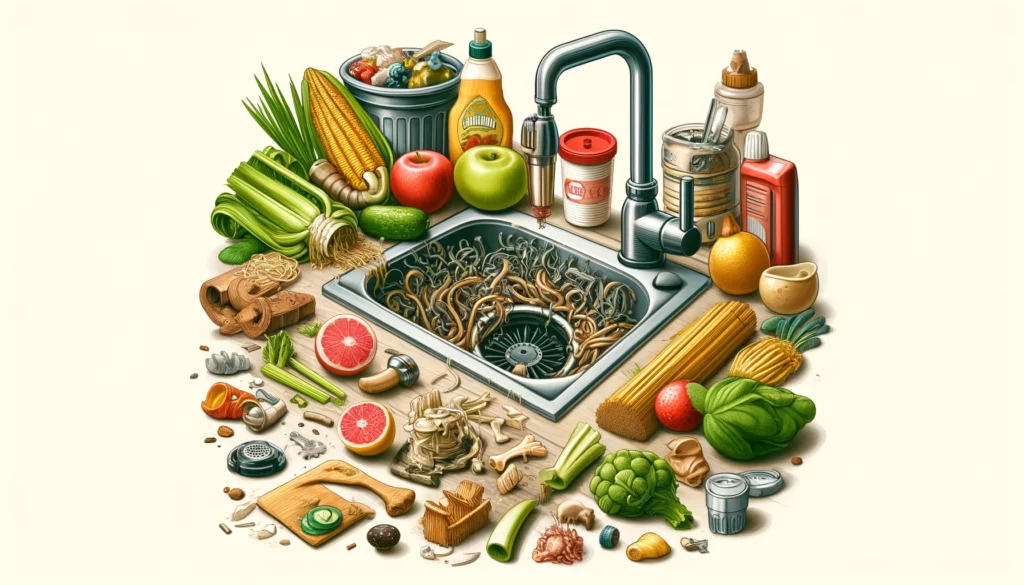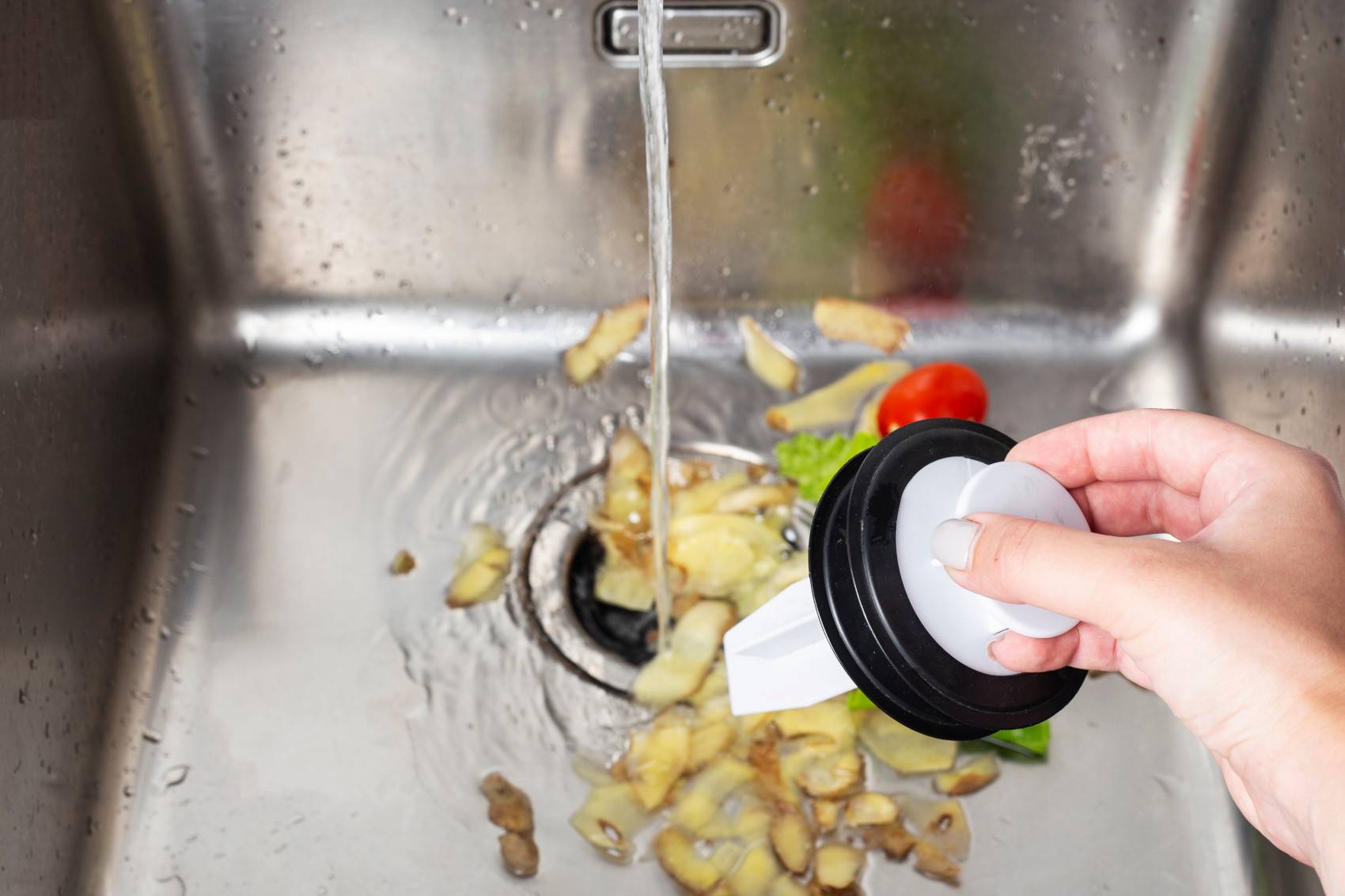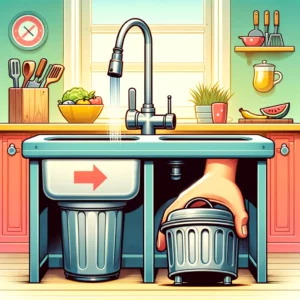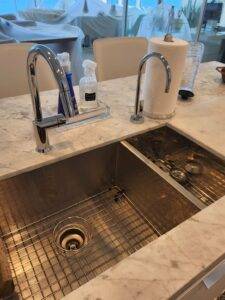Garbage disposals are handy kitchen tools, but when they malfunction, repairs can quickly go awry. Homeowners often make the same mistakes when trying to fix these devices, leading to more significant issues and costly repairs. Understanding these common pitfalls can save time, money, and frustration. Here are seven frequent mistakes to avoid when dealing with a garbage disposal.
 1. Using Hot Water
1. Using Hot Water
Hot water seems logical, but it’s a mistake. Hot water can melt grease, causing it to solidify further down the pipes, leading to clogs. Always use cold water when running the disposal. Cold water keeps fats solid, allowing the disposal to chop them up before they can coat the pipes. This simple switch can prevent blockages and costly repairs. Avoid the temptation of using hot water and keep your disposal and pipes flowing smoothly.
2. Ignoring Safety Precautions
Never skip safety steps. Unplug the disposal before any repair. Electricity and water are a dangerous mix. Many injuries occur because people forget this simple rule. Use tools like tongs or pliers, not your hands, to remove obstructions. Gloves and eye protection add extra safety. Ignoring these precautions can lead to severe injuries and even electrocution. Prioritize safety every time you approach a garbage disposal repair.
3. Overloading the Disposal
Stuffing too much food at once strains the motor and blades. Overloading leads to jams and can burn out the motor. Feed the disposal gradually. Small batches allow the blades to process efficiently and prevent clogging. Avoid fibrous foods like celery and corn husks; they tangle the blades. Hard items like bones and fruit pits can damage the disposal. Keep portions manageable and your disposal will last longer and run smoother.
4. Attempting Repairs Without Proper Tools
Improvising with the wrong tools spells trouble. Using makeshift items can damage the disposal or cause injury. Invest in essential tools like a hex wrench, pliers, and a flashlight. A proper hex wrench fits the disposal’s manual crank slot, allowing you to free jams safely. Pliers help remove debris without risking your fingers. A flashlight gives a clear view of the problem area, preventing accidental damage. Having the right tools makes the job easier and safer, avoiding unnecessary complications.
5. Disposing Improper Items

Your garbage disposal isn’t a catch-all for kitchen waste. Misusing it can lead to blockages, damage, and expensive repairs. Certain items should never go down the disposal as they can harm the blades or clog the pipes. Here are the common culprits:
- Fibrous Foods: Celery, corn husks, and asparagus can tangle around the blades.
- Grease and Oils: These solidify and create blockages further down the line.
- Hard Items: Bones, fruit pits, and nutshells can break the blades.
- Starchy Foods: Rice, pasta, and potato peels expand and stick, causing clogs.
- Non-Food Items: Glass, plastic, and metal should never be disposed of in the unit.
Dispose of these items properly to keep your garbage disposal functioning smoothly. Using it correctly extends its lifespan and avoids costly plumbing issues.
6. Ignoring Strange Noises
Strange noises from your garbage disposal are warning signs. Each sound indicates a different problem, and ignoring them can lead to serious damage. A persistent hum might mean a jammed impeller or a foreign object stuck in the blades. Grinding noises could signal worn-out blades or debris causing friction.
Pay attention to these noises:
- Humming: Likely a jammed impeller. Disconnect the power and manually rotate the impeller to free it.
- Grinding: Indicates debris or worn blades. Inspect and clean the blades thoroughly.
- Clanking and Banging: Loose parts or foreign objects. Check for loose components and remove any foreign objects.
- Whirring: Motor issues. Inspect the motor for damage or wear.
Address these noises promptly to prevent more extensive and costly repairs. Regular maintenance and prompt action can keep your garbage disposal running smoothly and extend its lifespan.
Read Also: 8 Signs Your Shower Drain Is Clogged
 7. Skipping Regular Maintenance
7. Skipping Regular Maintenance
Neglecting regular maintenance leads to costly repairs and reduces the lifespan of your garbage disposal. Simple, routine care can keep it running efficiently and prevent major issues. Here are some essential maintenance tips:
- Run Cold Water: Always use cold water when operating the disposal to solidify any grease or fat, making it easier for the disposal to chop them up.
- Clean Regularly: Use a mixture of ice cubes and vinegar to clean the blades and remove buildup. Grinding citrus peels also helps eliminate odors and freshen the unit.
- Avoid Harsh Chemicals: Do not use harsh cleaners that can damage the disposal’s internal components. Stick to natural cleaning solutions.
- Use the Disposal Frequently: Regular use prevents rust and corrosion. Run the disposal with cold water even when not actively using it to keep the parts moving smoothly.
Regular maintenance is simple but crucial. It extends the life of your garbage disposal, ensuring it remains efficient and problem-free.
Avoiding common mistakes when fixing your garbage disposal can save you time, money, and headaches. Always prioritize safety, use cold water, avoid overloading, and ensure you have the right tools for the job. Don’t put improper items down the disposal, pay attention to unusual noises, and maintain the unit regularly. These simple practices will keep your garbage disposal running smoothly and efficiently for years to come.


 1. Using Hot Water
1. Using Hot Water 7. Skipping Regular Maintenance
7. Skipping Regular Maintenance



